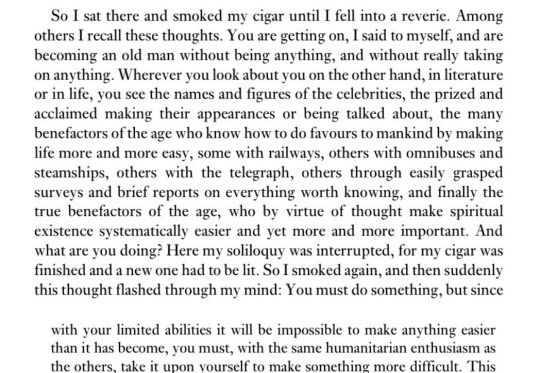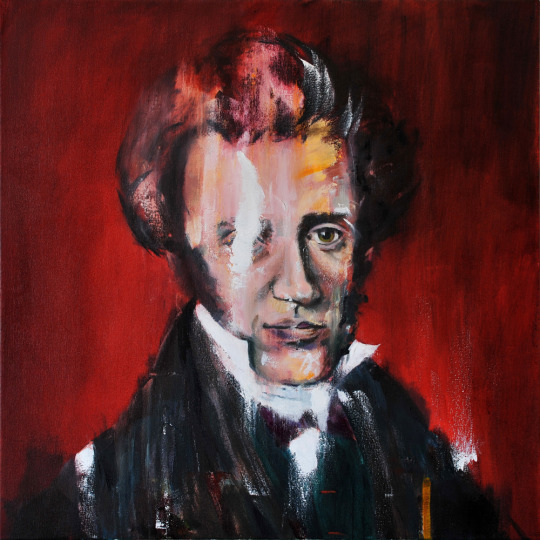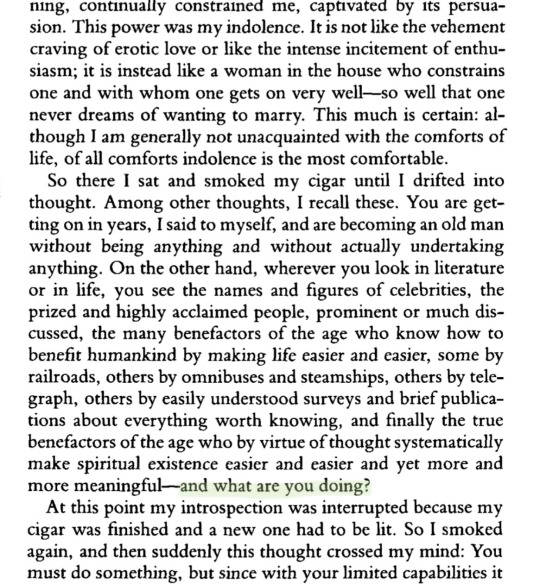#concluding unscientific postscript
Explore tagged Tumblr posts
Quote
Socrates is standing and gazing into space; then two passers-by come along and one says to the other: What is that man doing? The other replies: Nothing. Let us suppose that one of them has a little more of an idea of inwardness. He describes Socrates action as a religious expression and says: He is absorbed in the divine; he is praying. Let us concentrate on the latter expression “He is praying.” But is he using words, perhaps ever so many words? No, Socrates understood his God-relationship in such a way that he did not dare to say anything at all for fear of talking a lot of nonsense and for fear of having a wrong desire fulfilled.
Søren Kierkegaard, Concluding Unscientific Postscript
#philosophy#quotes#Søren Kierkegaard#Concluding Unscientific Postscript#Socrates#attention#inquiry#prayer#language
68 notes
·
View notes
Note
KIERKENGARD MENTIONED OMG I AM LITERALLY READING HIS WORK RIGHT NOW book club please
YEAAAA BOOK CLUB!!!
what work are you reading?

This is what made me think about Kierkegaard just now on that one post. He really said: "I'm going to make things difficult". And, if your experience reading his writings has been anything like mine, then you'll be inclined to agree that he achieved his goal lol
#i still enjoyed it immensely. it was just a challenge to even Understand anything#this is from concluding unscientific postscript which i read for a philosophy postgrad admission essay i had to write#im supposed to start classes in october yay! <3#prepare for me to become even more unbearable on my blog everyone..#also Hi BOOKCLUB!!!!!#whoiskt#whoiskt my beloved#asks
5 notes
·
View notes
Text

“In my relationship with God, I must learn simply to give up my finite understanding, and with it the drawing of distinctions that is natural to me, in order always to be able in divine madness to give thanks.” -Søren Kierkegaard, “Concluding Unscientific Postscript to Philosophical Fragments”
#spiritual#spirituality#mystical#mysticism#religion#philosophy#soren kierkegaard#kierkegaard#book quote#quotes#quotation
8 notes
·
View notes
Text
"If the subject has not worked himself through and out of his objectivity, every appeal to another individual will merely be a misunderstanding"
- Kierkegaard, Concluding Unscientific Postscript
2 notes
·
View notes
Text

Soren Kierkegaard by Mike Newton (2017)
“Dewey: Do you remember the first book by Kierkegaard which you read?
Percy: Yes, it was his first one: Either/Or. I remember thinking that this was going to be an easy one because of the section on "The Diary of the Seducer" in there. I'd been reading that the existentialists claimed him as their intellectual progenitor, so I was expecting something as accessible as Sartre's plays and novels or Marcel's plays. It was very difficult to read. I thought it was a hopeless undertaking.
So after trying that I tried a couple of other things. Sickness unto Death is a great title but I found myself in difficulty all over again. It is very difficult to read. Repetition is difficult. But I had almost given up when I skipped to Concluding Unscientific Postscript. Either I had read somewhere or somebody had told me that that book had the most direct kind of communication. And fortunately, perhaps because I had had such trouble before, I had no difficulty. I could read that straight through. It was, to me, the real open door into Kierkegaard.
Of course, there is no trouble reading the Edifying Discourses since they are very homiletic in nature. But that wasn't what I was after, really.
Dewey: Kierkegaard's ideas on despair and the self from Sickness unto Death - how despair permeates society and how the individual struggles with this seem to come through a lot in your novels.
Percy: I worked hard on Sickness unto Death. I knew he was getting at something very important, very important to me, and I finally got it. Strangely enough, the harder you work at it the more important it seems to be to you when you finally do understand what he is getting at.
The whole history of my reading Kierkegaard consists of repeated attempts of reading and then frustration, leaving it alone and then coming back to it and reading it again. I'd read Postscript then go back and try to read Repetition, because in Postscript he would sum up all the works and the different stages. I would read about the stages and then go back and try to read Kierkegaard's book, Stages on Life's Way - which I never did like as well as the description of the stages in Postscript. So really Postscript was a kind of oasis. I'd go back there to get straight on things, gather more energy, and get up nerve - then take out into the desert to try to figure out Kierkegaard's pseudonymous writings.
So reading Kierkegaard is like growing up; it takes a long time, many years, a lot of work. And I still can't say that I have read him thoroughly or even completely.
(…)
Dewey: Did you talk to other people about Kierkegaard?
Percy: There was nobody to talk to.
(…)
Dewey: I am wondering about Kierkegaard's opposition to the idea of "going beyond" Christianity into some kind of vague, humanistic mysticism. Hegel went beyond Christianity to a general humanism, blending all specific religions together into an absolute religion. It seems that in all your novels there is someone who wants to go beyond Christianity.
Percy: Yes. But not just going beyond it. I would say that Christianity was absolutely the last solution they would have accepted.
They would begin by eliminating Christianity, and not even consider it as a viable alternative. My own development, and it is also important in the novels, has been a relationship to humanism - humanism understood as a non-Christian humanism, a secular, scientific humanism. I suppose the great bombshell with me was the famous passage of Kierkegaard's describing Hegel as the philosopher who lived in a shanty outside the palace of his own system and saying that Hegel knew everything and said everything, except what it is to be born and to live and to die. He left out something! For me, the great thing about Kierkegaard was that he expressed my own feelings about the whole scientific synthesis. You see, my whole education had been in science for twenty-five years, particularly at Columbia University Medical School. You could describe that as almost the quintessential institute of scientific humanism. And so I had my feelings that this was not enough, that there was something left over, that after you say all this, after you learn everything that you can at Columbia about what it is to be a human being, there is something awfully important left over. I was trying to systematize it, to see how you could talk about it. And having been brought up scientifically, I had a great respect for scientific rigor, rigor and precision of language. I certainly didn't want to say, well, besides science we have emotion and art that's the alternative. Of course, that had been the standard alternative, the American philosophical alternative starting with Dewey. On the one hand there was a science and on the other hand there was art, or play, or emotion. I knew that wasn't right. There had to be a more serious alternative than that. And so you can imagine what an eye opener it was to stumble on a couple of passages by Kierkegard who was saying (and the existentialists like - I said, I read the French existentialists first - seemed to be saying the same thing) that something has been left out by any kind of synthesis, by a scientific synthesis or a philosophical synthesis. And that, namely, what is left out is nothing less than the individual himself. This was a tremendous breakthrough, very exciting if this was true. Then of course what I discovered was that this was Kierkegaard's main subject of interest. Number one, the fact that the individual what it is to be a man, to live and to die, to be an individual is left out of the Hegelian system. But then he goes on to define what it is to be an individual. This is the other great thing. Here he says something that is just as staggering as the first statement. Namely, that - did he say it in Sickness unto Death? - the only way to be yourself is to be yourself transparently before God. It was a most enigmatic statement, but very important.
So what was important about Kierkegaard to me was that he was a man who was trying to open up a whole new area of knowledge to me in the most serious way, in the most precise way and quite as serious as any science, or more serious. And, of course, it is religious too. This was a far cry from the other alternative that I had always read about, that the alternative to science is art, play, emotion. I saw for the first time through Kierkegaard how to take the alternative system seriously, how to treat it as a serious thinker, as a serious writer. Before that I would have simply seen it as just religion or emotion. I hadn't seen any way to think about it. Kierkegaard gave me a way to think about it.
(…)
The most important single piece that Kierkegaard wrote is something I seldom hear about and a lot of people don't know too well. It's his essay called "The Difference between a Genius and an Apostle." That was tremendously important to me. Kierkegaard says that a genius is a man who arrives at truth like a scientist or a philosopher or a thinker. Truth, as he calls it, sub specie aeteri. He can arrive at a truth anywhere, anytime, anyplace, whereas an apostle has heard the news of something that has happened, and he has the authority to tell somebody who hasn't heard the news what the news is. I made use of this essay throughout several of the books. The whole structure of Binx's search is based on it. He talks about the horizontal search and the vertical search. The vertical search consisted of the times when he would read books about the philosophy of life, or about Einstein's theory of the universe or Schrödinger's - the German physicist - The World as I See It, and a book called The Chemistry of Life, and he understood it all. But he finished the book by midnight, and then his problem was to draw one breath and then the next, which is like Kierkegaard. Kierkegaard had an example of a young man who was given a task of working all day long and he finished the job at noon. That was one of Kierkegaard's crazy allusions. So that's the vertical search, in other words, what Kierkegaard would call the work of a genius. The fellow who figures out all the systems and all the formulas knowledge sub specie aeteri-which can be figured out anywhere, anytime, or any hour. But having done that, you see, he still has to draw one breath and then the next.
And then Binx goes to his horizontal search, which took the form in this case not of religion, but a kind of a debased religious fear of searching. He knew he had run out of the esthetic sphere-the women and music and science, and so forth. (And, incidentally, I place science in the esthetic sphere. I don't know whether Kierkegaard does that or not. I think that science and art are very closely allied there.) But he had run out of all this and had embarked on what he called a horizontal search. By this he certainly did not mean looking for God, although he talks about that. He rules out the search for God in the beginning, because he says that Americans already believe in God. Everybody believes in God, so how can you search for something everybody believes in? So he embarked on kind of an antic search which was still in the esthetic mode: going out, walking around, walking out to the lake at night, walking out to see the river, taking a ferry to Algiers, going to movies. So this is all still very much in the esthetic. But the two searches were certainly very much patterned after The Difference between a Genius and an Apostle - with that very much in mind.
I think Kierkegaard said if the hearer of the news asks the apostle, "On what grounds am I supposed to believe this news?" the apostle simply replies that "I have the authority to tell it to you, and if you don't believe me it is your fault. If I didn't have the authority, I wouldn't be telling you. You better believe it, and if you don't believe it it's on your own head." That was a tremendous distinction, a very clear distinction between the two. I used it very consciously at the end of The Last Gentleman. This priest who is a very ordinary, mediocre priest, has been dragged in by the scruff of the hair, so to speak, to baptize Jamie who was dying. Jamie can't talk to the priest; he is talking to Barrett. And Barrett is not aware of what is going on, exactly. All he has is a certain amount of equipment, a certain radar, a certain sensitivity. He knows that Jamie can understand him and he can understand Jamie. He can translate both to Sutter Vaught and to the priest. So the priest gives his spiel and says, "Do you believe in the Lord Jesus Christ?" He sets out the truths of the faith, like the Apostles' Creed. Jamie is supposed to say "Yes."
Jamie looks at Barrett and says, "What do you think? Am I supposed to believe this?" Barrett turns to the priest and says, "Is he supposed to believe this? How does he know it's true?" And the priest says, "If it wasn't true I wouldn't be here, that's why. I'm here. I'm telling you. If it weren't true I wouldn't be telling you." So that was a direct steal from Kierkegaard.
(…)
Percy: One big difficulty for me in reading Kierkegaard was that I had no philosophical training at all, especially about Hegel or the German idealists. That was a great obstacle and stumbling block for years. Kierkegaard was attacking Hegel. For a long time I thought that was irrelevant. I said, well, what difference does it make whether he successfully demolished Hegel or not, until I realized that you could very successfully extrapolate his attack on Hegel against what we might call scientism. The same thing he said about the Hegelian system might be said about a purely scientific view of the world which leaves out the individual. So once I made that extrapolation from Hegel, whom I cared nothing about, to a whole, scientific, exclusive world view, it became very relevant.” - ‘Walker Percy Talks about Kierkegaard: An Annotated Interview’, Bradley R. Dewey (The Journal of Religion, 54 July 1974),
#percy#walker percy#kierkegaard#soren kierkegaard#søren kierkegaard#hegel#christianity#science#scientism#philosophy#existentialism
9 notes
·
View notes
Text
Odds & Ends: September 1, 2023
Benchmade Bugout Knife. I’m always on the lookout for new pocket knives. I recently picked up the Benchmade Bugout based on reviews that I’ve read about it, and I’m digging everything about this simple folding knife. It’s a great EDC knife — slim and lightweight but incredibly sturdy and strong. You can open the blade easily with one hand, and holding the knife feels great. The length of the blade is perfect too. “How Chuck Norris Facts Gave Birth to the Modern Meme.” If you’ve been on the internet for more than 15 years, you remember Chuck Norris Facts. Notable examples: * When Chuck Norris does a pushup, he’s pushing the Earth down. * Chuck Norris doesn’t read books. He stares them down until he gets the information he wants. * Chuck Norris drinks napalm to fight his heartburn. This article from ESPN takes a deep dive into the history of Chuck Norris Facts and makes the case that they gave birth to the modern-day meme. Make sure to check out our podcast episode about 1980s action heroes, including Chuck Norris. Concluding Unscientific Postscripts by Søren Kierkegaard. My deep dive into Kierkegaard this year continues. I just finished his beast of a book entitled Concluding Unscientific Postscripts. It’s been on my to-read list ever since Jacob Howland mentioned the book in our podcast episode about Kierkegaard’s The Present Age. Kierkegaard’s big idea in this book is the distinction between objective and subjective truth. Objective truth consists of facts about the world that we can all agree on. The world is round, 2+2=4, etc. Subjective truth consists of personal, religious, and existential experiences that can only be experienced by a person individually. Feeling passion about life, love for a child, or faith in God are examples of subjective truths. For Kierkegaard, life is about cultivating those inner subjective truths. To be clear, Kierkegaard’s idea of subjectivity isn’t that truth is relative or whatever you want it to be; rather, it’s about experiencing life with vitality and passion. Concluding Unscientific Postscripts is a long book and hard to read, but packed with some great insights about life, faith, and being a human being. Did People Look Older? If you’ve ever looked through your parents’ high school yearbooks, you probably felt like the 17-year-olds in 1962 looked like they were 30. I’ve got some magazines from the 1940s called Pic: The Magazine for Young Men. They feature “young men” on the make, and the guy will look like he’s 45, but the caption says he’s only 29. What gives? Did people actually look older in the past or do our brains think they look older because we’re looking at old pictures? YouTuber Vsauce investigates in this fascinating video. Quote of the Week Labor is one of the great elements of society, the great substantial interest on which we all stand; not feudal service, or predial toil, or the irksome drudgery by one race of mankind subjected on account of their color, to another; but labor, intelligent, manly, independent, thinking and acting for itself, earning its own wages, accumulating those wages into capital, educating childhood, maintaining worship, claiming the right of the elective franchise, and helping to uphold the great fabric of the State—that is American labor; and all my sympathies are with it, and my voice, till I am dumb, will be for it. —Daniel Webster The post Odds & Ends: September 1, 2023 appeared first on The Art of Manliness. http://dlvr.it/SvVfrW
2 notes
·
View notes
Text
"A system of existence cannot be given. Is there, then, not such a system? That is not at all the case. Neither is this implied in what has been said. Existence itself is a system—for God, but it cannot be a system for any existing spirit. System and conclusiveness correspond to each other, but existence is the very opposite. Abstractly viewed, system and existence cannot be thought conjointly, because in order to think existence, systematic thought must think it as annulled and consequently not as existing. Existence is the spacing that holds apart; the systematic is the conclusiveness that combines."
—Søren Kierkegaard, Concluding Unscientific Postscript
0 notes
Text
Eksistensialis Gaya Soren Kierkergaard
Sebelum terlalu jauh memahami pemikiran SK, akan lebih baik jika terlebih dahulu melihat kehidupan dan pengalaman kehidupan yang membuat SK mampu memaknai peristiwa secara berbeda. Konteks eksistensialisme SK barangkali terjadi akibat berbagai penderitaan hidup yang dialaminya.
Kehidupan rumah tangga yang pelik, diawali ketika dia ditinggal 5 kakaknya dan ayahnya dalam waktu relatif singkat. Hingga sampai terjadi fenomena kematian gurunya, terakhir ditutup dengan kegagalan cinta pada Regina Olsen. Pertemuan dan jatuh cinta pada gadis ini membawa SK pada kebimbangan yang pelik. Antara 1) jatuh cinta dan ingin membahagiaan melalui jalur kebahagiaan, dan 2) ketakutan untuk adanya kesakitan melalui adanya hubungan antara SK dan Regina. Tepat sekali, SK memilih pilihan yang ke-2. SK memilih mengembalikan cincin pertunangan melalui sebuah catatan berikut:
"Jangan terlalu sering mempertimbangkan sesuatu yang harus dilakukan. Maafkanlah orang ini yang meskipun mampu segala hal, namun tidak mampu membahagiakan orang yang dia cintai."
Kegagalan pertunangan menyebabkan buruk reputasi SK. Desas - desus cemoohan terdengar, sampai pada keputusan untuk pindah ke Berlin. Hingga 6 bulan akhirnya kembali ke Kopenhagen. Kabar buruk akhirnya datang, Regina bertunangan dengan orang. Makin hancurlah hatinya.
Demikian jika kita telusuri, ada 3 orang yang sangat berperan dalam kehidupan pikiran SK, yaitu 1) Michael Pedersen Kiergergaard (Ayah); 2) Paul Martin Moller (Guru saat sekolah Teologi), dan 3) Regina Olsen (Mantan Tunangan). Keterpurukan hidup ternyata mampu menjadi titik balik yang baik dalam kisah SK. Berbagai problema dilampiaskan dengan tulisan refleksi eksistensialis yang bercorak khas. Gaya eksistensialis Søren Kierkegaard menekankan pentingnya kebebasan individu dalam membuat pilihan dan pengambilan keputusan yang autentik. Menurut Kierkegaard, individu harus memilih untuk hidup dengan penuh tanggung jawab dan kesadaran akan eksistensi mereka, serta mengambil risiko dalam menghadapi ketidakpastian dan keberanian dalam menghadapi ketakutan. Kierkegaard menekankan bahwa kebebasan individu adalah kunci dalam mencapai kehidupan yang bermakna dan autentik.
Beberapa karya terkenal Søren Kierkegaard antara lain:
"Enten-Eller" (Either/Or) - Karya ini menggambarkan perbedaan antara gaya hidup estetis dan etis.
"Frygt og Bæven" (Fear and Trembling) - Karya ini membahas konsep keberanian dan ketakutan dalam agama, terutama dalam kisah Abraham dan Ishak.
"Sygdommen til Døden" (The Sickness Unto Death) - Karya ini membahas konsep keputusasaan dan keputusasaan yang merupakan bagian dari eksistensi manusia.
"Stadier paa Livets Vei" (Stages on Life's Way) - Karya ini menggambarkan perjalanan spiritual dan psikologis individu dalam mencapai kedewasaan dan kematangan.
"Afsluttende uvidenskabelig Efterskrift" (Concluding Unscientific Postscript) - Karya ini merupakan kritik terhadap sistem filosofi Hegelian dan penjelasan lebih lanjut tentang konsep iman.
Sisi religius Søren Kierkegaard sangat kental dalam pemikirannya. Kierkegaard adalah seorang teolog Kristen yang memadukan pemikiran filosofisnya dengan keyakinan agamanya. Beberapa poin penting terkait sisi religius Kierkegaard adalah:
Pengalaman iman yang subjektif. Kierkegaard menekankan pentingnya pengalaman iman secara subjektif, di mana individu harus memilih untuk mempercayai tanpa memiliki bukti rasional yang pasti. Konsep ini dikenal sebagai "leap of faith" atau loncatan iman.
Konsep absurditas iman. Kierkegaard berpendapat bahwa iman Kristen, seperti keyakinan akan inkarnasi atau Tritunggal, terlihat absurd atau tidak masuk akal secara rasional. Namun, melalui iman yang subjektif, individu dapat melebihi keterbatasan rasionalitas.
Penghormatan terhadap otoritas agama. Meskipun Kierkegaard kritis terhadap gereja dan institusi agama, ia tetap menghormati otoritas agama dan kebenaran iman Kristen.
Tanggung jawab moral. Kierkegaard meyakini bahwa iman Kristen harus tercermin dalam tindakan moral individu sehari-hari. Iman yang sejati akan menghasilkan perubahan dalam perilaku dan sikap hidup.
0 notes
Quote
‘Is it not precisely the simple that is most difficult for the wise man to understand?’
Johannes Climacus, Concluding Unscientific Postscript, p.160
28 notes
·
View notes
Quote
What I write contains the notice that everything is to be understood in such a way that it is revoked, that the book has not only a conclusion but has a revocation to boot. ... [The reader] can understand that to write a book and revoke it is not the same as refraining from writing it, that to write a book that does not demand to be important for anyone is still not the same as letting it be unwritten.
Søren Kierkegaard, Concluding Unscientific Postscript
#philosophy#quotes#Søren Kierkegaard#Concluding Unscientific Postscript#conclusions#revocation#irony#literature#books
37 notes
·
View notes
Photo

From Søren Kierkegaard’s Concluding Unscientific Postscript
38 notes
·
View notes
Text

“Is the absence of inwardness also lunacy? The objective truth as such does not at all decide that the one stating it is sensible; on the contrary, it can even betray that the man is lunatic, although what he says is entirely true and especially objectively true.” -Søren Kierkegaard, “Concluding Unscientific Postscript to Philosophical Fragments”
5 notes
·
View notes
Quote
Abstract thinking helps me with my immortality by killing me as a particular existing individual and then making me immortal as a particular existing individual, and, therefore, helps somewhat as in Holberg: the doctor took the patient’s life with his medicine—but also drove out the fever.
Søren Kierkegaard, Concluding Unscientific Postscript
4 notes
·
View notes
Text




søren kierkegaard, from concluding unscientific postscript to philosophical fragments
[text id:] It is now about four years since the idea came to me of wanting to try my hand as an author. I remember it very clearly. It was on a Sunday; yes, correct, it was a Sunday afternoon. As usual, I was sitting outside the café in Frederiksberg Gardens (...) I had been a student for half a score of years. Although never lazy, all my activity nevertheless was like a glittering inactivity, a kind of occupation for which I still have a great partiality, and for which perhaps I even have a little genius. I read a great deal, spent the rest of the day loafing and thinking, or thinking and loafing, but nothing came of it. The productive sprout in me went for everyday use and was consumed in its first greening. An inexplicable power of persuasion, both strong and cunning, continually restrained me, captivated by its persuasion. This power was my indolence. It is not like the vehement craving of erotic love or like the intense incitement of enthusiasm; it is instead like a woman in the house who constrains one and with whom one gets on very well–so well that one never dreams of wanting to marry. This much is certain: although i am generally unacquianted with the comforts of life, of all comforts indolence is the most comfortable. So, there I sat and smoked my cigar until I drifted into thought. Among other thoughts, I recall these. You are getting on in years, I said to myself, and are becoming an old man without being anything and without actually undertaking anything. On the other hand, wherever you look in literature and life, you see the names and figures of celebrities, the prized and highly acclaimed people, prominent and much discussed, the many benefactors of the age who know how to benefit humankind by making life easier and easier, some by railroads, others by omnibuses and steamships, others by telegraph, others by easily understood surveys and brief publications about everything worth knowing, and finally the true benefactors of the age who by virtue of thought systematically make spiritual existence easier and easier and yet more and more meaningful- and what are you doing? At this point my introspection was interrupted because my cigar was finished and a new one had to be lit. So I smoked again, and suddenly this thought crossed my mind: You must do something, but since with your limited capabilities it will be impossible to make anything easier than it has become, you must, with the same humanitarian enthusiasm as the others have, take it upon yourself to make something more difficult.
#i heard this in a podcast and just wanted it here#also why is the image quality always so bad 🤧#soren kierkegaard#fragments
135 notes
·
View notes
Quote
Woe to him who would judge hearts!
Søren Kierkegaard, Concluding Unscientific Postscript
51 notes
·
View notes